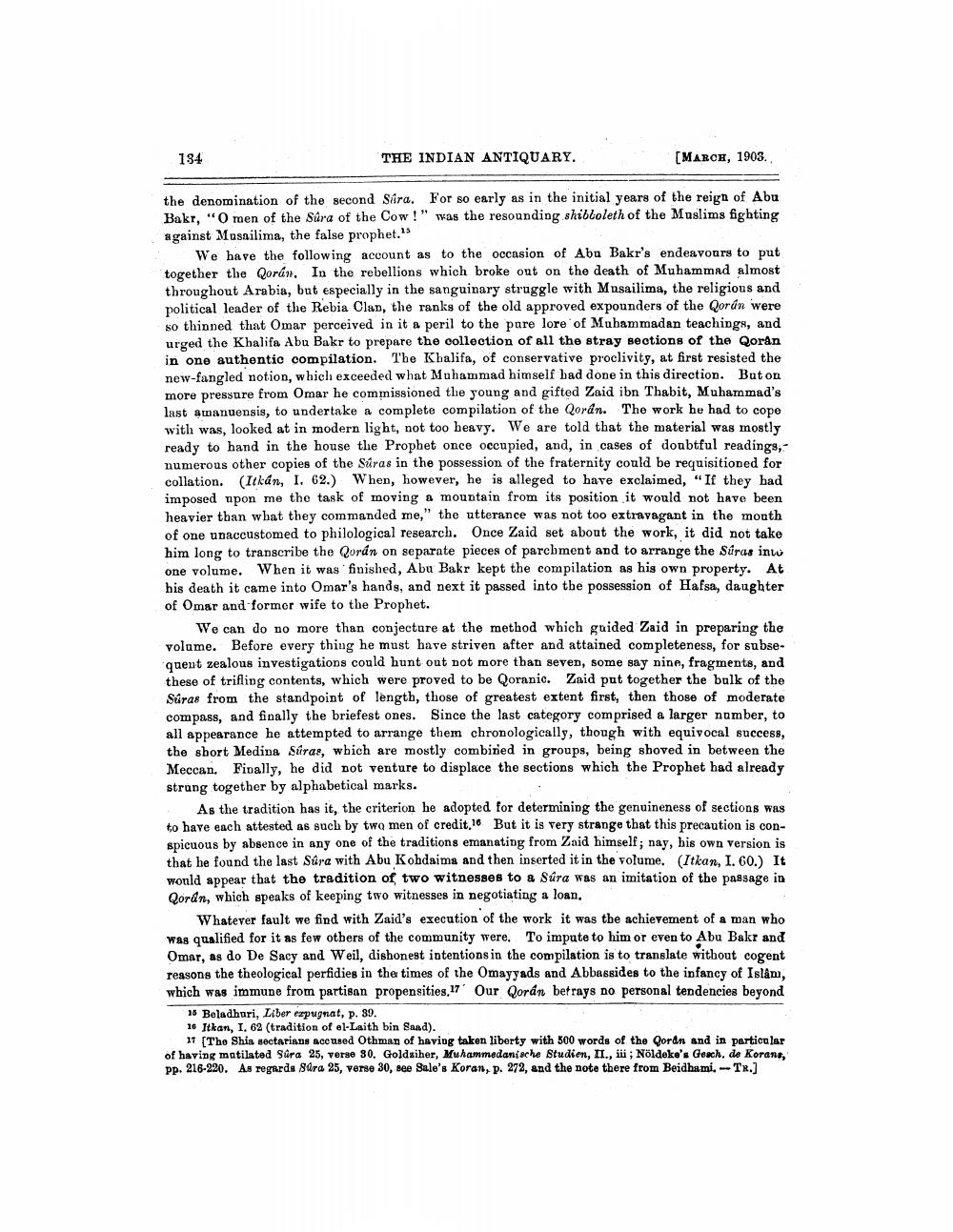________________
134
THE INDIAN ANTIQUARY.
[MARCE, 1903.
the denomination of the second Sara. For so early as in the initial years of the reign of Abu Bakr, "O men of the Súra of the Cow!" was the resounding skibloleth of the Muslims fighting against Musailima, the false prophet."
We have the following account as to the occasion of Abu Bakr's endeavours to put together the Qorán. In the rebellions which broke out on the death of Muhammad almost throughout Arabia, but especially in the sanguinary struggle with Musailima, the religious and political leader of the Rebia Clan, the ranks of the old approved expounders of the Qorán were 60 thinned that Omar perceived in it a peril to the pare lore of Muhammadan teachings, and urged the Khalifa Abu Bakr to prepare the collection of all the stray sections of the Qoran in one authentic compilation. The Khalifa, of conservative proclivity, at first resisted the new-fangled notion, which exceeded what Muhammad himself bad done in this direction. Buton more pressure from Omar he commissioned the young and gifted Zaid ibn Thabit, Muhammad's last amanuensis, to undertake a complete compilation of the Qorán. The work he had to cope with was, looked at in modern light, not too heavy. We are told that the material was mostly ready to hand in the house the Prophet once occupied, and, in cases of doubtful readings, numerous other copies of the Súras in the possession of the fraternity could be requisitioned for collation. (Itkán, I. 62.) When, however, he is alleged to have exclaimed, "If they had imposed upon me the task of moving a mountain from its position it would not have been heavier than what they commanded me," the utterance was not too extravagant in the month of one unaccustomed to philological research. Once Zaid set about the work, it did not take him long to transcribe the Quran on separate pieces of parchment and to arrange the Súras intu one volume. When it was finished, Abu Bakr kept the compilation as his own property. At his death it came into Omar's hands, and next it passed into the possession of Hafsa, daughter of Omar and former wife to the Prophet.
We can do no more than conjecture at the method which guided Zaid in preparing the volume. Before every thing he must have striven after and attained completeness, for subsequent zealous investigations could hunt out not more than seven, some say nine, fragments, and these of trifling contents, which were proved to be Qoranic. Zaid put together the bulk of the Súras from the standpoint of length, those of greatest extent first, then those of moderate compass, and finally the briefest ones. Since the last category comprised a larger number, to all appearance he attempted to arrange them chronologically, though with equivocal success, the short Medina Súras, which are mostly combined in groups, being shoved in between the Meccan. Finally, he did not venture to displace the sections which the Prophet had already strung together by alphabetical marks.
As the tradition has it, the criterion he adopted for determining the genuineness of sections was to have each attested as such by two men of credit 16 But it is very strange that this precaution is conspicuous by absence in any one of the traditions emanating from Zaid himself; nay, bis own version is that he found the last Sara with Abu Kohdaima and then inserted it in the volume, (Itkan, I. 60.) It would appear that the tradition of two witnesses to a Súra was an imitation of the passage in Qoran, which speaks of keeping two witnesses in negotiating a loan,
Whatever fault we find with Zaid's execution of the work it was the achievement of a man who was qualified for it as few others of the community were. To impute to him or even to Abu Bakr and Omar, as do De Sacy and Weil, dishonest intentions in the compilation is to translate without cogent reasons the theological perfidies in the times of the Omayyads and Abbassides to the infancy of Islam, which was immune from partisan propensities.17' Our Qorán betrays no personal tendencies beyond
15 Beladhuri, Liber expugnat, p. 89. 16 Itkan, I. 62 (tradition of el-Laith bin Saad).
Shia actarians accused Othman of having taken liberty with 500 words of the Qoran and in particular of having matilated Sdra 25, verso 30. Goldsiher, Muhammedanische Studien, II., ; Nöldeke's Geach, de Korans, Pp. 216-220. As regards Sdra 25, verse 30, see Sale's Koran, p. 272, and the note there from Beidhami. --Tr.]




